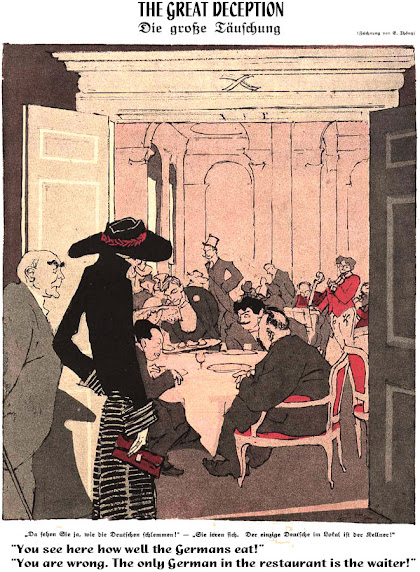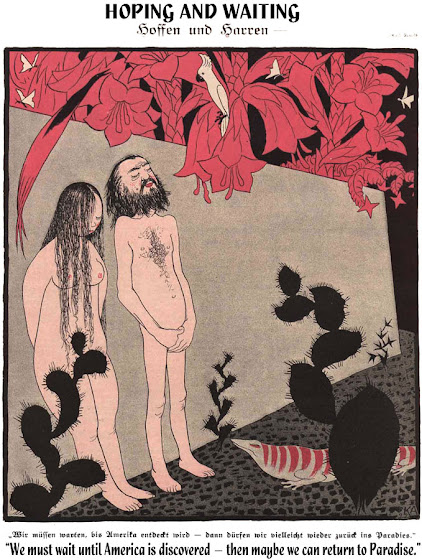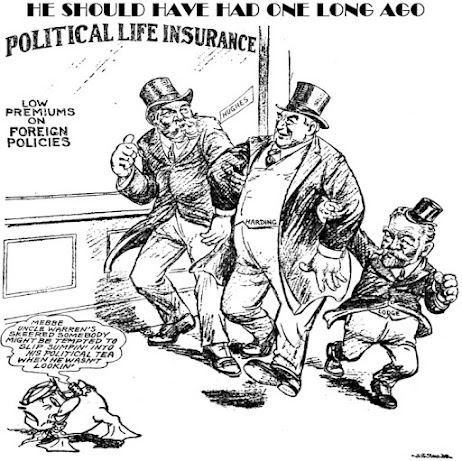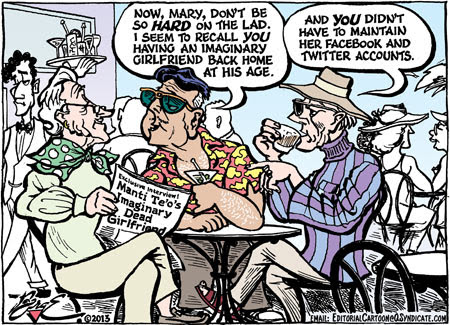News coverage of poor old Kevin McCarthy's present travails trying to convince his own caucus to elect him Speaker of the House has often mentioned that the last time such an election took more than one ballot was a century ago. So naturally, I started rummaging through newspapers from 1923 in search of editorial cartoons about their experience.
It turns out that their experience was somewhat different from Mr. McCarthy's. The election of Frederick Gillett (R-MA) as Speaker in 1923 took three days and nine ballots; but for one thing, Gillett was already Speaker of the House, and had been since 1919.
 |
| "The Only Cloud on the Horizon" by Nelson Harding in Brooklyn Daily Eagle, December 3, 1923 |
But, as with the 2022 election, the 1922 election proved disappointing for Republicans. Going into the election with a congressional supermajority, the GOP lost a whopping 75 House seats. Republicans still had a majority, albeit a much narrower one; and a faction of the party — this time, the Progressives — wanted to see changes in party leadership. When the 68th Congress finally began its sessions in December — yes, December!—there were enough Progressives among Republicans to hold the Speaker's chair hostage.
 |
| "Wake Up" by Clifford Berryman in Washington Sunday Star, December 2, 1923 |
Why didn't the 68th Congress's convene until December? Back then, congressional terms began in March, not January. Furthermore, Gillett and the Old Guard, realizing their weakened position, delayed convening the 68th Congress until the fall, by which time President Harding had died and been succeeded by Calvin Coolidge.
By December, Coolidge wanted to deliver an address on government funding to a joint session of Congress, and he couldn't do that until the House was in session. Gillett couldn't put the election of a Speaker off any longer.
 |
| "The Balance of Power" by Roy James in St. Louis Star, December 4, 1923 |
Progressives coalesced behind a Republican from Racine, Wisconsin, Henry Cooper. On the first ballot, Gillett received 197 votes, Cooper 17, Illinois Republican Martin Madden five, Tennessee Democrat Finis Garrett 195, and "present" four (Cooper, Garrett and Gillett themselves, plus Socialist Victor L. Berger of Wisconsin). Cooper's votes included those of 15 Republicans, plus two Farmer-Labor Congressmen from Minnesota, Ole Kvale and Knud Wefald.
 |
| "Trouble at the Club" by Daniel Fitzpatrick in St. Louis Post-Dispatch, December 5, 1923 |
No candidate having achieved the necessary 208 votes, the House proceeded to a second ballot. This time, Gillett held at 197 votes in spite of changing from voting "present" to voting for himself. Cooper's support also held steady at 17 votes, while Garrett picked up a vote. The House adjourned to try again the next day.
 |
| "Help, Somebody" by Bill Sykes in Philadelphia Public Ledger, Dec., 1923 |
Democrat- and Progressive-leaning cartoonists such as Fitzgerald and Sykes took gleefully to their drawing boards.
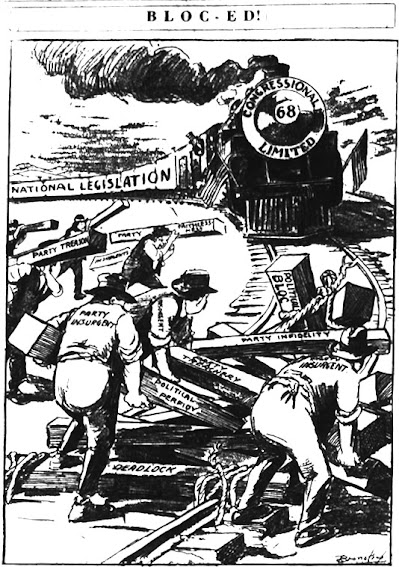 |
| "Bloc-ed" by Gustavo Bronstrup in San Francisco Chronicle, December 5, 1923 |
Republican-leaning cartoonists such as Bronstrup castigated the progressive "insurgents," also called "radicals," for thwarting the GOP agenda. In case you're trying to read his cartoon on a handheld device, the ties these insurgents are piling onto the train tracks are labeled "party treason," "party faithlessness," "political bloc," "party treachery," "political perfidy," and "deadlock."
 |
| "Anyhow Thy Can't Blame Me" by Clifford Berryman in Washington Evening Star, December 3, 1923 |
This cartoon by Clifford Berryman stars a powerful former Speaker of the House, Joe Cannon (R-IL), who had retired from the House at the end of the 67th Congress.
 |
| "Quit Your Skidding" by Nelson Harding in Brooklyn Daily Eagle, December 6, 1923 |
As a side note, other than Berryman's cartoon of Joe Cannon, none of these cartoons appear to me to feature caricatures of the principals involved. Gillett had thinning hair and sported a goatee; Cooper was wearing a white beard by this time.
 |
"The Fruits of Victory" by Roy James in St. Louis Star, December 6, 1923
|
Finally, Cooper and the Progressive insurgents accepted promises of a seat on the House Rules Committee and a pledge of opportunity later to freely propose changes to House rules. Speaking on the House floor over another Congressman's objections, Cooper thanked the seventeen who voted for him in each of the previous eight ballots:
"[I]n view of the maledictions — I almost might have said curses — heaped upon the heads of the men who, without asking my consent, proposed me for Speaker — I have never asked anybody to cast a vote for me for the position — I thought I had a right, if not in justice to myself, then in justice to the men who have stood by me so loyally in the midst of this hurricane of slander and abuse, to say a word in extenuation of their offense..."
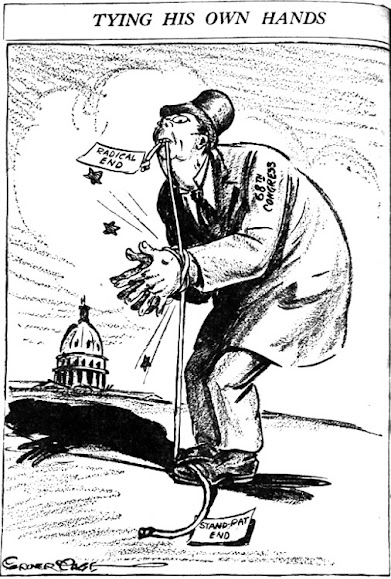 |
| "Tying His Own Hands" by Grover Page in Louisville Courier-Journal, December 5, 1923 |
Although two representatives stubbornly continued to vote for Illinois's Martin Madden (who had consistently voted for Gillett), Cooper and most of the other Progressives joined the rest of the Republican Party, and Gillett won the Speakership on the ninth ballot with 215 votes.
 |
| "The Elephant Tamer" by Dorman H. Smith for Newspaper Enterprise Assn., Dec. 1923 |





